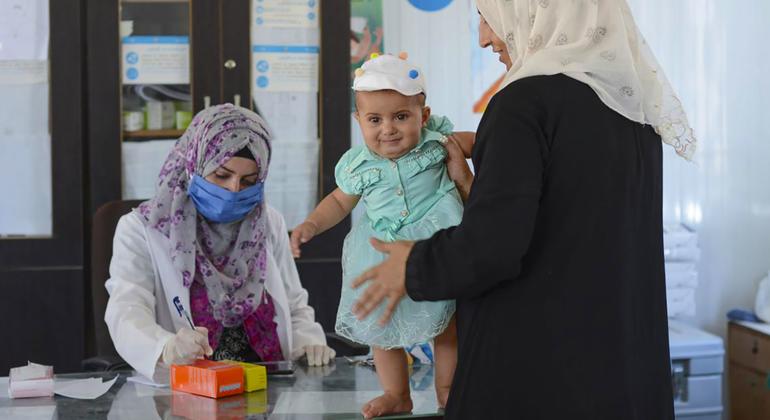The online meeting was held ahead of a European Union conference next week to ensure ongoing international support for Syria and neighbouring countries hosting millions of Syrian refugees.
The needs inside Syria are staggering. This year, 12.2 million people will require health services, including some 4.4 million who are internally displaced, according to an emergency appeal launched by the World Health Organization (WHO).
Challenges to health delivery
“The delivery of health services to those most in need remains extremely challenging; not only due to the COVID-19 pandemic but also because more than half the healthcare facilities have closed or function partially,” said Dr. Akjamal Makhtumova, the agency’s Representative to Syria.
WHO hosted the virtual meeting, together with the Italian Agency for Development Cooperation (AICS) and the UN Development Programme (UNDP).
Dr. Ahmed Al-Mandhari, Director of WHO’s Regional Office for the Eastern Mediterranean, said keeping global attention on Syria can be a challenge, given that the war has raged for more than a decade and other crises continue to emerge, including the pandemic and the Ukraine conflict.
“While it’s true – television crews that once documented children pulled from rubble and hospitals bombed into ruins aren’t documenting Syria’s plight as they once were – the suffering of the Syrian people still exists,” he said.
Dr. Al-Mandhari recently concluded a mission to Syria. He shared heartbreaking examples of suffering, including the story of a single mother of two blind boys who waited two years for heart surgery.
Syria has lost over half of its medical professionals since the war started, and hospital equipment is stretched.
Healing and empowering
Dr. Al-Mandhari said WHO is collaborating with partners “to heal Syria and empower it to become a country of peace and prosperity – to build resilient communities, protect health rights and reduce social inequities”.
He underscored how improving health in Syria aligns with global efforts to achieve sustainable development that benefits all people and the planet.
This requires new international cooperation that would sustain both the resilience and health of the Syrian people, with focus placed on areas such as investment, knowledge sharing, policy and legislation.
“Equitable and peaceful future of Syria depends on the renewed commitment of the international community, member states and partners,” he said. “We need new multilateralism towards attaining health for the people of Syria and ensuring social and economic stability, and shared prosperity.”
End the suffering
While acknowledging the enormous needs and suffering, Dr. Al-Mandhari said he returned from Syria with optimism, pointing to signs of resilience and hope.
“Despite scarce financial and human resources, I also saw medical professionals moving mountains to serve their people. Despite the pain I felt, I met the wonderful people behind these devastating numbers,” he said.
“Let us not forget the Syrian people. Let us end their suffering. Let us give them our attention, especially now when the declining socio-economic situation has left millions in need for help.”



